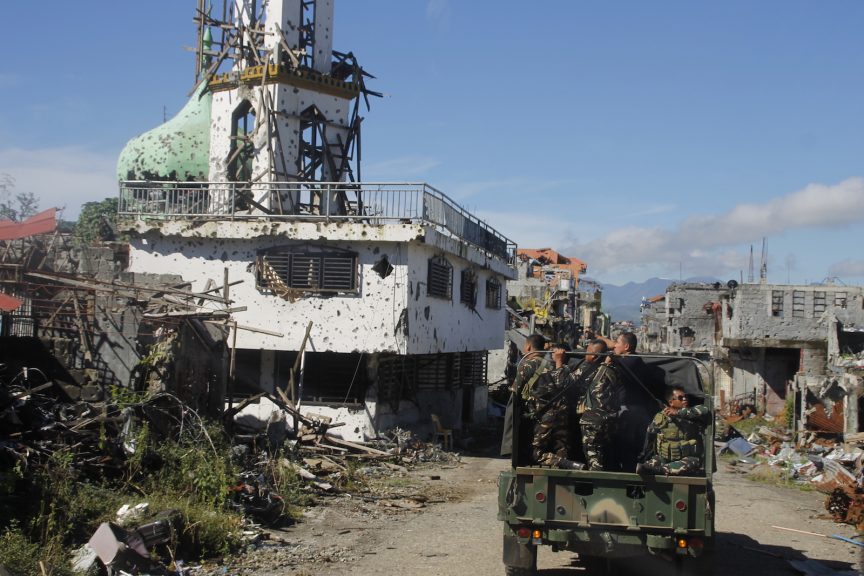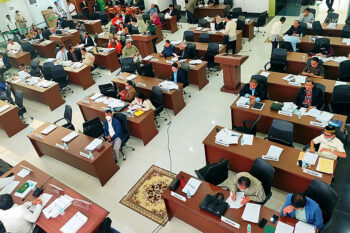DAVAO CITY (MindaNews / 11 April) — At least 60 percent of residents in conflict-affected areas live below the poverty line and the “reputational damage” caused by security concerns slowed down growth even in unaffected areas by limiting investment and tourism revenues, the World Bank-funded Mindanao Jobs Report said.
 Soldiers survey the ruins of the 5-month siege in Marawi City in this photo taken on Feb. 20, 2018. The Autonomous Region in Muslim Mindanao is the most conflict-affected area in Mindanao. MindaNews file photo by H. MARCOS C. MORDENO
Soldiers survey the ruins of the 5-month siege in Marawi City in this photo taken on Feb. 20, 2018. The Autonomous Region in Muslim Mindanao is the most conflict-affected area in Mindanao. MindaNews file photo by H. MARCOS C. MORDENO
The study said the decades-old armed conflicts in Mindanao affected 62 percent of the island’s total population, dampened efforts to reduce poverty level, and kept the businesses small-scale and small farmers at subsistence level to “avoid kidnap and extortion.”
It added areas known to be unaffected by violence “bear the fiscal burden of coping with displaced persons.”
Citing the United Nations High Commissioner for Refugees, the study said that nearly a million residents were displaced due to a series of armed clashes in August 2014, displacing 41 percent of the population of the five-province Autonomous Region in Muslim Mindanao (ARMM) and adjacent provinces.
Residents from Basulta (Basilan, Sulu, Tawi-Tawi) in ARMM and Central Mindanao migrated in 2015 to safer areas in the Philippines and around 470,000 Filipinos fled to neighboring Sabah, Malaysia.
Of those who went to Sabah, 25 percent were considered “stateless” with no birth certificates or passports to prove their nationality, reducing “their access to jobs and services and increases their vulnerability to exploitation.”
“On the other hand, more peaceful areas have benefited from opportunities to process agricultural produce from conflict-affected areas, where processing facilities are rare. And many skilled workers from conflict-affected areas have migrated to other regions of Mindanao,” it said.
Security concerns also depressed tourism and boosted the emigration of skilled workers, the study said.
But it said economic policies and programs can “support peace efforts by providing jobs for workers who might otherwise be tempted to join extremists’ armed groups or organized crime, and by doing better job of delivering basic government services.”
It cited that the conflicts can be addressed by reaching a settlement on grievances stemming from social and political disputes, and suggested delivering government programs and basic services.
“While many who take part in violence do so for ideological reasons, others join armed groups to escape poverty,” it said.
It suggested that delivering government programs and basic services more effectively could help alleviate the problem, for instance, cash-for-work programs that would benefit poor individuals and local communities, and entrepreneurship programs that provide small cash grants to people.
“The target groups should initially be people vulnerable to taking up arms, such as ex-combatants, out-of-school youth, and internally displaced people. After being piloted, programs could be expanded to other poor people to avoid the perception that they are rewarding participation in violence,” it said.
The study said that economic policy can support resolution of conflicts but a political settlement is necessary to address “issues at the root of the conflict, in particular a deep sense of injustice that is a consequence of greatly unequal political and economic power, and longstanding grievances over land dispossession.”
“It is clear, however, that poverty and economic hopelessness in conflict-affected areas help perpetuate conflict, as individuals without land or work opportunities are driven to join armed groups to survive or to seek social status,” it said.
It suggested providing an alternative income source and improving the delivery of basic services in neglected areas because the discontent resulted from social injustice and unequal distribution of economic opportunity and development resources.
It emphasized the need for jobs creation to address basic cause of conflict that “drives many, particularly out-of-school youths, to desperation” especially in the Basulta area where 24 percent of working-age youth are idle, higher than the national average of 16 percent.
But it emphasized that job creation initiatives should be managed carefully to avoid favoring one group over another while government must prioritize for cash-for-work program ex-combatants, out-of-school youth, and internally displaced people.
“After being piloted, programs could be expanded to other poor people to avoid the perception that they are rewarding participation in violence. Given the importance of social inclusion in forestalling violence, job creation schemes could give priority to programs that promote solidarity, such as group employment in public works and group borrowing for livelihood,” it said. (Antonio L. Colina IV/MindaNews)
